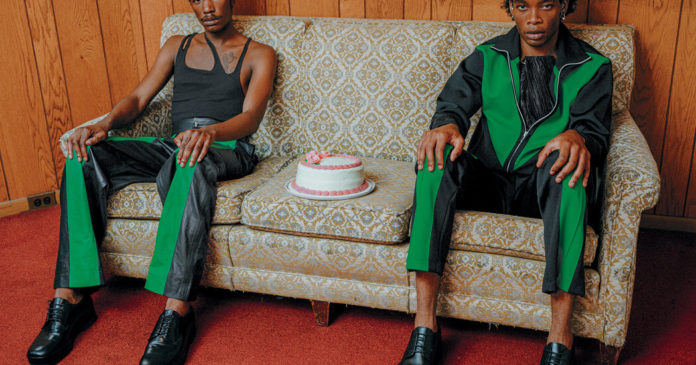
“THE WILD PARTY,” although it fills a book, isn’t actually very long. It takes only about an hour to read aloud, something that is worth doing, even if you’re alone and the empty corners of the room are your only audience. It feels like a spoken word performance, a distant ancestor of slam poetry and of the Beats (it’s fitting that William S. Burroughs later credited it as the work that made him want to become a writer — it shares his ice-pick sensibility). Say the words aloud, and they quickly start to feel like they’re being hissed quietly into an open mic at the end of a long night for anyone sober enough to still be listening; it’s a horror story designed to send even the most determined celebrants into the darkness with a faint shudder. Letting yourself hear the poem also gives you a sense of March’s erratic, idiosyncratic syncopation — a cascade of three or four quick rhymes, a little ABAB and then a little AABB, a run of smooth verse and then an unexpected rest or short phrase or series of abrupt two-word bullet points. It’s like riding aboard a hell-bound railroad train, but one that makes jolting local stops about every 20 seconds. You can’t settle in.
If March doesn’t comfort you, he does at least seduce you. From the start, “The Wild Party” is funny — whether he’s commenting on Queenie’s relaxed standards for male companionship:
They might be blackguards;
They might be curs;
They might be actors; sports; chauffeurs —
She never inquired
Of the men she desired
About their social status, or wealth:
She was only concerned about their health.
Or about one of the few men she can’t have:
His hips were jaunty,
And his gestures too dextrous.
A versatile lad!
He was ambisextrous.
Sometimes the poem will disarm you with a self-conscious joke:
Books?
Books?
My God! You don’t understand.
They were far too busy living first-hand
For books.
Books!
Or with an overt comment on its own technique:
Tense
Silence,
Foreboding sudden violence.
But March never lets the smile linger on your lips for too long before he wipes it away. From his first, unnerving portrait of Queenie in the poem’s opening lines (“Grey eyes. / Lips like coals aglow. / Her face was a tinted mask of snow”), he writes not with ink but with embalming fluid. There are a couple of passing racist and anti-Semitic lines that mark, and mar, “The Wild Party” as a work of its time. But the poem was undeniably a leap forward in its depiction of a much wider range of sexuality than most American literature of the 1920s was able to accommodate. Burrs and Queenie’s guests include a former prostitute, a bisexual male dancer, a lesbian and two apparently gay brothers who perform as a musical duo. One way in which the poem feels very 2021 is that March is clearly, to steal a phrase from nearly a century after he wrote, living for the drama; he grasps that there’s a lot to be mined from throwing all of these oversize, volatile types into a room and seeing just how much time it takes until the center cannot hold. But this isn’t a celebratory forerunner of queerness in all its variety. It would be a mistake to sentimentalize the Roaring Twenties as a time when all classes, ages and races could converge and mingle if the party was right; in that regard, it was more a moment when white cultural tourism became easier and more available than it had been. Accordingly, March attends but keeps his distance; these people give him the creeps, and he wants them to give you the creeps. The old-style-swishy brothers (“They functioned together with skill. / They lisped. / Their voices were shrill”) may be sleeping with each other (and may not be siblings); the lesbian is a cobra with eyes “Like a stagnant pool / Filled with slime”; and, when a gay love triangle seems to go bad, the onlookers “grinned: / Egged them on: / Cheered: laughed: derided.” (March is a man deeply in love with colons, and each one adds a little clenching halt that helps create the poem’s unpredictable start-and-stop rhythm.)
Even his description of the party is blood-chilling enough to make those readers who, for the last year and a half, have longed to re-experience the anything-goes luxury of splashing around in a sea of bodies (not to mention those who have wondered with trepidation what it might feel like to rejoin the social world) decide to stay in for the night:
The way they drank was unholy.
They hovered around the glass-filled tray
Ravenously,
Like birds of prey.
White, intense;
With mask-like faces
Frozen in rigid, gay grimaces.
Admittedly, “faces”/“grimaces” isn’t ideal, but go with it. The point is, something’s coming, something bad; March makes that apparent from the first pages. But even when he appears to drop some heavy hints:
Sunday noon:
Broiling hot.
Queenie woke up feeling shot.
You can’t trust him. The poem is clearly an obituary. You just don’t know for whom, for March is expert at misdirection.








